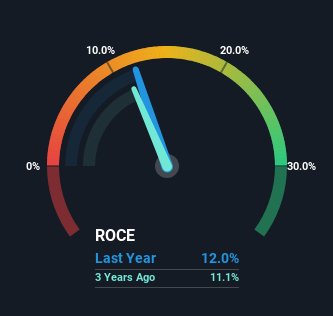- United States
- /
- Software
- /
- NasdaqGS:BSY
Bentley Systems (NASDAQ:BSY) May Have Issues Allocating Its Capital
If you're not sure where to start when looking for the next multi-bagger, there are a few key trends you should keep an eye out for. Firstly, we'll want to see a proven return on capital employed (ROCE) that is increasing, and secondly, an expanding base of capital employed. Basically this means that a company has profitable initiatives that it can continue to reinvest in, which is a trait of a compounding machine. Having said that, from a first glance at Bentley Systems (NASDAQ:BSY) we aren't jumping out of our chairs at how returns are trending, but let's have a deeper look.
Return On Capital Employed (ROCE): What Is It?
For those that aren't sure what ROCE is, it measures the amount of pre-tax profits a company can generate from the capital employed in its business. Analysts use this formula to calculate it for Bentley Systems:
Return on Capital Employed = Earnings Before Interest and Tax (EBIT) ÷ (Total Assets - Current Liabilities)
0.12 = US$297m ÷ (US$3.3b - US$786m) (Based on the trailing twelve months to June 2024).
Therefore, Bentley Systems has an ROCE of 12%. On its own, that's a standard return, however it's much better than the 8.6% generated by the Software industry.
See our latest analysis for Bentley Systems

In the above chart we have measured Bentley Systems' prior ROCE against its prior performance, but the future is arguably more important. If you'd like to see what analysts are forecasting going forward, you should check out our free analyst report for Bentley Systems .
How Are Returns Trending?
On the surface, the trend of ROCE at Bentley Systems doesn't inspire confidence. To be more specific, ROCE has fallen from 24% over the last five years. However, given capital employed and revenue have both increased it appears that the business is currently pursuing growth, at the consequence of short term returns. And if the increased capital generates additional returns, the business, and thus shareholders, will benefit in the long run.
On a side note, Bentley Systems has done well to pay down its current liabilities to 24% of total assets. That could partly explain why the ROCE has dropped. What's more, this can reduce some aspects of risk to the business because now the company's suppliers or short-term creditors are funding less of its operations. Since the business is basically funding more of its operations with it's own money, you could argue this has made the business less efficient at generating ROCE.
Our Take On Bentley Systems' ROCE
In summary, despite lower returns in the short term, we're encouraged to see that Bentley Systems is reinvesting for growth and has higher sales as a result. These growth trends haven't led to growth returns though, since the stock has fallen 13% over the last three years. As a result, we'd recommend researching this stock further to uncover what other fundamentals of the business can show us.
If you want to continue researching Bentley Systems, you might be interested to know about the 1 warning sign that our analysis has discovered.
While Bentley Systems isn't earning the highest return, check out this free list of companies that are earning high returns on equity with solid balance sheets.
Valuation is complex, but we're here to simplify it.
Discover if Bentley Systems might be undervalued or overvalued with our detailed analysis, featuring fair value estimates, potential risks, dividends, insider trades, and its financial condition.
Access Free AnalysisHave feedback on this article? Concerned about the content? Get in touch with us directly. Alternatively, email editorial-team (at) simplywallst.com.
This article by Simply Wall St is general in nature. We provide commentary based on historical data and analyst forecasts only using an unbiased methodology and our articles are not intended to be financial advice. It does not constitute a recommendation to buy or sell any stock, and does not take account of your objectives, or your financial situation. We aim to bring you long-term focused analysis driven by fundamental data. Note that our analysis may not factor in the latest price-sensitive company announcements or qualitative material. Simply Wall St has no position in any stocks mentioned.
About NasdaqGS:BSY
Bentley Systems
Provides infrastructure engineering software solutions in the Americas, Europe, the Middle East, Africa, and the Asia-Pacific.
Moderate growth potential with low risk.
Similar Companies
Market Insights
Community Narratives




